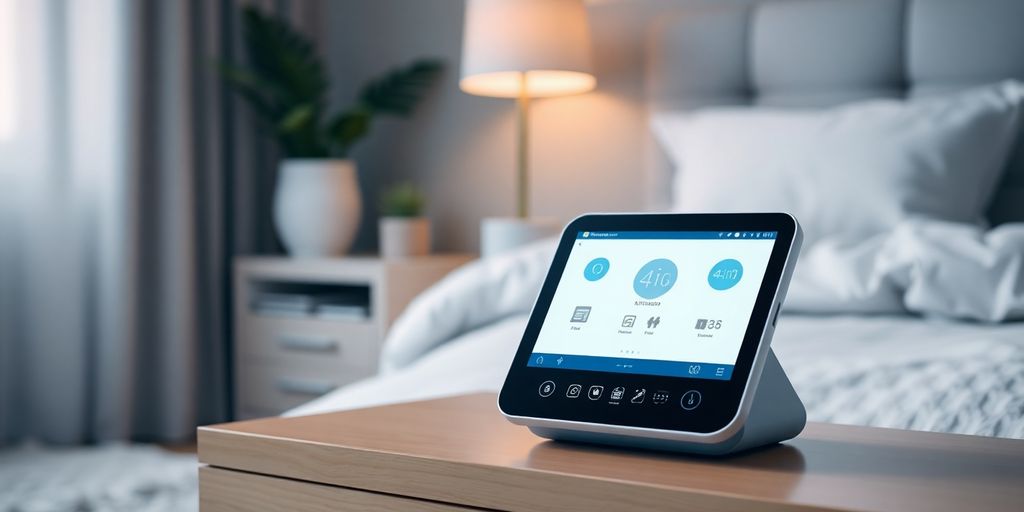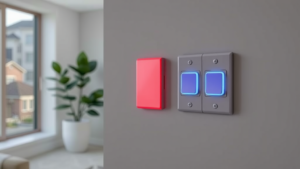AI is changing the way we handle health at home with Medical Tech. You know those annoying trips to the doctor for every little thing? Well, AI tools are stepping in to make it easier. These tools are like having a mini-doctor in your pocket, helping you figure out if you really need to see a professional or if you can manage on your own. They’re all about making healthcare more accessible and less of a hassle, especially with AI-powered diagnostic tools for home use. Let’s dive into how these tools are making a difference.
Key Takeaways
- AI tools make healthcare more accessible, breaking down barriers like distance and transport.
- AI symptom checkers help you understand your symptoms without needing a medical degree.
- These tools can guide you on the next steps, whether it’s seeing a doctor or taking a chill pill.
- AI in healthcare isn’t just for patients; it helps doctors make better decisions too.
- Using AI at home can save you money and time, reducing unnecessary doctor visits.
Enhancing Accessibility Through AI Tools
Overcoming Geographical Barriers
Living far from medical facilities can be a real hassle. Not everyone has a hospital or clinic just around the corner. AI tools are stepping in to change that. They bring healthcare right to your fingertips, no matter where you are. Imagine being in a remote village and still getting the medical advice you need without traveling miles. AI symptom checkers, for instance, allow you to input your symptoms and get immediate feedback on what might be wrong and what to do next. It’s like having a mini doctor in your pocket.
Addressing Transportation Limitations
Not everyone can hop in a car or catch a bus to the doctor’s office. Whether it’s due to lack of public transport, no access to a vehicle, or physical limitations, getting to healthcare can be tough. AI tools help bridge this gap by providing virtual consultations and health assessments. You can chat with a healthcare professional or run a quick symptom check without leaving your home. This is especially helpful for the elderly or those with mobility issues.
Navigating Sociocultural Challenges
Language barriers and cultural differences can make accessing healthcare daunting. AI tools often come equipped with multilingual support, making it easier for non-native speakers to understand and communicate their health concerns. Plus, these tools can be tailored to respect cultural sensitivities, ensuring everyone gets the care they need without feeling misunderstood or overlooked.
AI is transforming telemedicine by enhancing patient triage and diagnosis, leading to more efficient care pathways as healthcare providers expand virtual care options. This shift not only makes healthcare more accessible but also more personal and adaptable to individual needs.
AI-Powered Symptom Checkers

Understanding Symptoms Effectively
AI-powered home health monitoring systems have revolutionized the way we understand and manage health symptoms. These digital health diagnostic solutions for home use sophisticated algorithms to analyze symptoms reported by users. By leveraging artificial intelligence health screening devices, individuals can input their symptoms, which the system then compares against vast medical databases. This automated health analysis helps in pinpointing potential health issues with remarkable accuracy.
- Machine Learning & Natural Language Processing: These technologies enable digital symptom checkers to interpret user inputs in everyday language, making them accessible and user-friendly.
- Extensive Medical Databases: The systems draw on a wide array of medical knowledge, enhancing their diagnostic capabilities.
- Continuous Learning: As more data is inputted, these systems get smarter, continuously improving their diagnostic precision.
Guiding Next Steps in Care
Once symptoms are analyzed, digital symptom checkers can guide users on the next steps. They provide recommendations such as visiting a healthcare professional or managing symptoms at home. This guidance is crucial for individuals seeking immediate health insights without the need for an in-person consultation.
- Initial Assessment: Quickly assess symptoms to understand the severity.
- Actionable Advice: Offer practical steps, whether it’s resting, medication, or seeing a doctor.
- Follow-Up Suggestions: Advise on when to seek further medical attention if symptoms persist.
AI-powered systems are not just about identifying what’s wrong but also about empowering users to take informed actions based on their health monitoring.
Improving Patient Engagement
By utilizing smart health monitoring tools, patients are more engaged in their health management. These tools encourage proactive health management by providing users with a clear understanding of their health status. The ease of use and accessibility of these systems make them a preferred choice for many.
- User-Friendly Interfaces: Designed to be intuitive, making health monitoring straightforward.
- Educational Insights: Provide users with knowledge about their symptoms and potential conditions.
- Regular Updates: Keep users informed about their health status, promoting regular health monitoring.
The rise of AI in health monitoring has made it possible for individuals to take charge of their health with confidence. With tools like the AI-powered symptom checker from Ubie, users can easily assess their symptoms and make informed decisions about their health care.
Precision in Medical Diagnosis
Reducing Diagnostic Errors
Smart medical diagnostic tools for home use are changing the game by slashing the number of wrong diagnoses. It’s wild to think about, but around 10-15% of medical diagnoses are incorrect. AI is stepping in to close this gap. By using standardized, objective triage decisions, these tools minimize errors and help ensure patients get the right treatment fast. Imagine a world where you don’t have to rely on scribbled, hard-to-read notes from your last doctor’s visit. Instead, you have clear, accurate info at your fingertips.
Standardizing Triage Decisions
Remote diagnostic technology is making waves in how we handle patient triage. These AI systems can assess symptoms and suggest the right level of care, whether it’s a simple home remedy or a trip to the ER. This kind of standardization means there’s less guesswork involved, making healthcare more efficient and reliable. For instance, if you log symptoms of a bug bite, the AI might suggest self-care. But if it’s something serious, like a rash with fever, it will guide you to seek immediate medical attention.
Enhancing Treatment Accuracy
Medical device automation is taking treatment precision to new heights. These AI systems don’t just stop at diagnosis; they offer insights into the best treatment paths. By analyzing vast amounts of data, they can recommend the most effective therapies, reducing the trial-and-error that often comes with treating complex conditions. This not only improves patient outcomes but also boosts confidence in the healthcare system.
The integration of AI in medical diagnostics is not just about technology; it’s about providing peace of mind. Knowing that your diagnosis is backed by cutting-edge tech can be incredibly reassuring, especially in times of uncertainty.
Cost-Effectiveness of AI Solutions

Saving on Healthcare Costs
AI technology is reshaping the healthcare landscape by slashing costs. Home medical testing with AI technology can drastically cut down on unnecessary hospital visits. Many folks rush to the ER for minor issues, only to find out they could’ve managed it at home. AI symptom-checkers step in here, offering initial assessments that help people decide whether they need in-person care or not. This not only saves money but also frees up hospital resources for more serious cases.
Streamlining Patient Triage
AI-powered tools are great at triaging patients efficiently. They can quickly determine the severity of symptoms and suggest the next steps. This means healthcare providers can focus their attention where it’s needed most. By optimizing resource allocation, hospitals can avoid overcrowding and reduce wait times, making the whole process smoother for everyone involved.
Improving Resource Allocation
With AI applications, such as those in clinical settings, hospitals can better manage their resources. AI tools help in predicting patient needs and ensuring that medical staff, equipment, and facilities are utilized effectively. This not only enhances patient care but also contributes to significant cost reductions, as highlighted by AI implementation in healthcare which can range from $20,000 to $1,000,000. The savings are substantial when resources are allocated smartly, ensuring that healthcare systems operate more efficiently.
Empowering Patients with Self-Assessment
Facilitating At-Home Care
Home health tools are changing the way we think about healthcare. Digital health assessment tools let people check their symptoms and get a sense of their health status without leaving home. This is huge for those who can’t easily get to a doctor. With these tools, you can:
- Run a quick check on symptoms to decide if a doctor’s visit is necessary.
- Get advice on whether to see a specialist or manage with home remedies.
- Keep an eye on ongoing health conditions without frequent hospital trips.
These tools are like a first line of defense, helping you catch issues early and decide the best course of action.
Encouraging Proactive Health Management
Taking charge of your health has never been easier. With home medical screening options, you can:
- Regularly monitor your health stats like blood pressure or glucose levels.
- Set reminders for check-ups or medication.
- Access personalized health tips based on your data.
These steps help you stay on top of your health and make informed decisions about when to seek medical advice.
Providing Immediate Health Insights
Imagine waking up with a sore throat and not being sure if it’s serious. AI-powered symptom checkers can guide you on what to do next. They analyze your symptoms and suggest possible conditions, helping you decide if it’s time to see a doctor or just rest up. This instant feedback is invaluable for peace of mind and quick action.
Using these tools, patients are not only more informed but also play a key role in their healthcare journey. They provide a bridge between self-care and professional medical advice, making health management more accessible and less daunting.
AI tools are a game-changer, offering immediate insights and promoting a proactive approach to health. They not only help in understanding symptoms but also in planning the next steps, ensuring that patients are engaged and informed throughout their healthcare journey. For more on how digital tools are enhancing care delivery, check out AHRQ-funded initiatives.
Transforming Healthcare for Professionals

Reducing Workload for Minor Issues
In today’s fast-paced world, healthcare professionals are constantly juggling multiple tasks. Digital health tools are making a significant impact by reducing the workload associated with minor health issues. These tools allow professionals to focus more on critical cases, ensuring better patient outcomes. By automating routine tasks, such as appointment scheduling and follow-ups, health tech innovations free up valuable time for healthcare providers.
Compiling Comprehensive Patient Data
The integration of AI in healthcare is rapidly advancing, revealing insights into patient behaviors and professional perspectives, while also comparing various platforms that are shaping the future of patient care. AI-powered systems are capable of compiling comprehensive patient data from various sources, providing a holistic view of the patient’s health. This not only improves diagnostic accuracy but also enhances the personalization of care plans. Telemedicine solutions, for instance, can seamlessly integrate with existing systems to provide real-time data access, enhancing the overall efficiency of healthcare delivery.
Enhancing Clinical Decision-Making
AI and machine learning are transforming clinical decision-making processes. By analyzing vast amounts of data, these technologies provide healthcare professionals with actionable insights, leading to more informed decisions. This is particularly beneficial in complex cases where traditional methods might fall short. With the help of AI, clinicians can predict patient outcomes more accurately, tailor treatments, and ultimately improve the quality of care. As digital health continues to evolve, its role in enhancing clinical decision-making becomes increasingly indispensable.
In the era of digital health, the integration of AI and telemedicine solutions is not just a trend but a necessity for modern healthcare systems. These innovations are reshaping the way professionals approach patient care, allowing for more efficient and effective healthcare delivery.
AI in Preventive Medicine

Identifying Health Risks Early
AI diagnostics are changing how we spot health risks. By analyzing genetic data, lifestyle choices, and wearable metrics, AI can flag potential issues before they become serious. This proactive approach allows individuals to address health concerns early, potentially avoiding more severe outcomes. AI-powered tools provide insights that help people take charge of their health, encouraging a shift from reactive to proactive healthcare.
Promoting Regular Health Monitoring
Regular health monitoring is crucial for maintaining good health, and Medical AI makes it easier than ever. With AI-driven applications, users can track their health metrics, receive alerts for any anomalies, and get personalized health advice. These tools simplify the process of staying informed about one’s health status, making it more accessible and less time-consuming.
- Continuous tracking: Wearable devices and apps keep tabs on vital signs and other health indicators.
- Timely alerts: AI systems notify users of any concerning changes in their health data.
- Personalized advice: Get tailored recommendations based on individual health profiles.
Encouraging Healthy Lifestyle Choices
AI diagnostics not only identify risks but also promote healthier lifestyle choices. By providing personalized feedback and suggestions, AI tools can guide users towards better habits. Whether it’s recommending dietary changes or suggesting exercise routines, these tools help users make informed decisions about their health.
In a world where health information can be overwhelming, AI simplifies the path to better living by offering clear, actionable insights. This not only supports individual well-being but also contributes to a healthier society overall.
By integrating AI into preventive medicine, we move towards a future where healthcare is not just about treating illnesses but about preventing them. The focus shifts to maintaining health and well-being, reducing the burden on healthcare systems, and enhancing quality of life for everyone.
Wrapping It Up: The Future of AI in Home Health
So, there you have it. AI is not just a buzzword; it’s changing the way we think about healthcare at home. These tools are making it easier for folks to get a handle on their health without stepping foot in a doctor’s office. Whether it’s figuring out if that cough is just a cold or something more serious, AI is helping people make informed decisions. And let’s not forget, it’s not just about convenience. It’s about making healthcare more accessible to everyone, no matter where they live or what their situation is. As these technologies keep getting better, who knows what the future holds? One thing’s for sure, though: AI is here to stay, and it’s going to keep transforming how we take care of ourselves. So, next time you’re feeling under the weather, maybe give one of these AI tools a shot. You might be surprised at how much they can help.
Frequently Asked Questions
How do AI tools make healthcare easier to access?
AI tools help people get healthcare by letting them check symptoms and get advice from home. This is great for those who live far from doctors or can’t travel easily.
What are AI-powered symptom checkers?
AI-powered symptom checkers are tools that help you figure out what’s wrong by looking at your symptoms. They guide you on what to do next, like seeing a doctor or trying home care.
How does AI help doctors make better decisions?
AI helps doctors by giving them accurate data and suggestions. This helps doctors choose the best treatment and reduce mistakes.
Are AI tools in healthcare cost-effective?
Yes, AI tools can save money by helping doctors see only the patients who really need care. This way, hospitals can use their resources better.
Can AI tools help me take care of my health at home?
Absolutely! AI tools let you check your symptoms and decide what to do next. This helps you take charge of your health without always needing to see a doctor.
How do AI tools help in preventive medicine?
AI tools can find health problems early, suggest regular check-ups, and help people make healthy choices to stay well.



